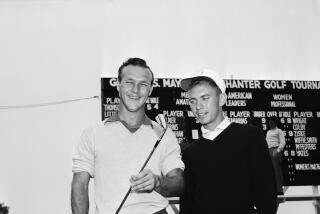A consumer’s guide to the best and worst of sports media and merchandise. Ground rules: If itcan be read, played, heard, observed, worn, viewed, dialed or downloaded, it’s in play here.
- Share via
What: Golf infomercials.
Any golfer knows golf infomercials on television aren’t to be believed. No one hits a perfect shot every time, except on a golf infomercial. The message is always, use this club and you’ll never hit another bad shot, and the ball will go higher, farther and straighter. You hear announcers say, “The ball exploded off the club face,” or “It’s so effective it’s like teeing up your driver in the middle of the fairway.”
NBC golf commentator Roger Maltbie was in Irvine recently making some commercials for Orlimar, a Hayward, Calif., golf club manufacturer that has gone from a small family company to major player almost overnight via the infomercial route.
Maltbie says he is careful to investigate products before endorsing them and says consumers should evaluate infomercials for believability. “One thing is independent test results,” he said. “Another is a money-back guarantee.”
Of course, no product is as good as it appears on an infomercial. This might not come as a surprise, but there is selective editing involved. The makers simply don’t use the bad shots, and they use only the best comments. “When we ask people for an endorsement, of course we’re going to pick ones that will help us sell the product,” said infomercial director Randy Argue. “That’s the whole idea.”
Do golf infomercials work? Well, Orlimar, featuring a new line of Trimetal fairway woods, grossed about $1.5 million last year and, because of an infomercial, made $4 million in the first quarter this year. According to a spokesman, the Orlimar infomercial, co-produced by Argue Productions and Mike Abram’s Golf Solutions, cost about $400,000 to make. In addition, air time on various TV outlets came to about $1.5 million over a one-month period. The infomercial was credited with 80% of the $4 million in sales, and the company is projecting that sales could total $75 million by the end of the year. In this case, the infomercial worked big time.
One advantage Orlimar’s Trimetal has over Callaway’s Big Bertha is a smaller head size. The USGA is threatening to outlaw oversized metal clubs like the Big Bertha, and Orlimar is emphasizing this advantage with the pitch, “It’s not oversized, it’s the right size.”
Another catchy phrase, perfect for an infomercial.
More to Read
Go beyond the scoreboard
Get the latest on L.A.'s teams in the daily Sports Report newsletter.
You may occasionally receive promotional content from the Los Angeles Times.










